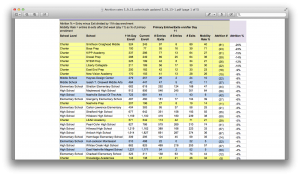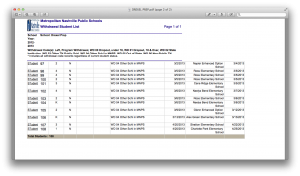Jeremy Mohler of In the Public Interest tells the real story of National School Choice Week:
Last week was “National School Choice Week,” and odds are you’re confused. Why was there a week dedicated to something nobody would argue against? Shouldn’t every child be able to attend a great school?
The answers lie in who paid for the bright yellow scarves and signs on display at last week’s thousands of events.
Surely some well-meaning parents and students celebrated. But they were joined by powerful people who, despite what they say, don’t believe that every child deserves a great school.
Instead, these people believe in a certain kind of choice over all others. In their worldview, market choice is more important than democracy, parents are consumers rather than members of a broader community, and education is a competition between students, with winners and losers.
National School Choice Week was founded in 2011 by the Gleason Family Foundation, the philanthropy arm of a machine tool manufacturing company in Rochester, New York. As of 2017—the most recent year data is publicly available, albeit incomplete—the foundation gave at least $688,000 to organize the self-described “nonpartisan, nonpolitical, independent public awareness effort.” The total is likely higher—in 2014, the foundation’s spending on the week topped $4.3 million.
The Gleason Family Foundation has little public presence, not even a website, but much can be gleaned from who it supports. As of 2016, it had given money to the American Legislative Exchange Council (ALEC), the Cato Institute, the Friedman Foundation for Educational Choice (now called EdChoice), and countless other conservative organizations bent on privatizing public education.
So, the “choice” in National School Choice Week clearly means certain educational options, namely private school vouchers and charter schools, which are publicly funded but privately operated.
But it goes further than that. By recklessly pushing vouchers and charter schools at all costs, the privatizers funding the school choice movement actually aim to eliminate choices for parents, students, and teachers.
Shouldn’t parents have the choice to send their child to a well-funded neighborhood public school? Yet, private school vouchers siphon precious funding from public school districts, many of them already struggling to raise revenue.
Additionally, research has shown that each new charter school that opens diverts money from districts. Charter schools cost Oakland, California’s school district $57.3 million per year, meaning $1,500 less in funding for each student who attends a neighborhood school. Last fall, the struggling district moved forward with a plan to begin closing 24 of its 80 schools. Budget pressure caused by unlimited charter school growth surely contributed to this decision.
Simply put, allowing more and more charter schools to open threatens the existence of by-right, neighborhood public schools.
Polling shows that parents prefer neighborhood public schools, as long as those schools receive adequate investment. A majority of Americans also agree that public schools need more money. Yet, the well-funded, conservative members of the school choice movement don’t agree with these choices.
ALEC and think tanks like Cato are staunch advocates for lower taxes on corporations and the wealthy, which has slowly drained money from America’s public education system, especially in the wake of the 2008 recession.
The majority of states continue to spend less on education than they did ten years ago. More than half of the country’s public schools are in need of repairs. In 2018, more than 60 percent of schools didn’t employ a full- or part-time nurse. Nationally, teacher pay is so low, nearly 1 in 5 teachers works a second job.
This all fits squarely with the school choice movement’s worldview that market competition belongs everywhere, even in public education. Instead of investing in all public schools, and especially those where the needs are greatest, the likes of the Gleason Family Foundation want our communities to leave public education up to private markets.
Simply put, the funders of National School Choice Week don’t share the same values as the many parents who just want a great school for their child.
Here’s what school choice should mean: every family should be able to make their neighborhood school their top choice, and every school should be a first choice for somebody.

For more on education politics and policy in Tennessee, follow @TNEdReport
Your support — $5 or more today — makes publishing education news possible.





